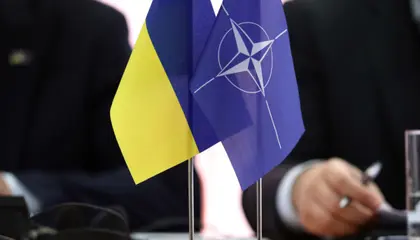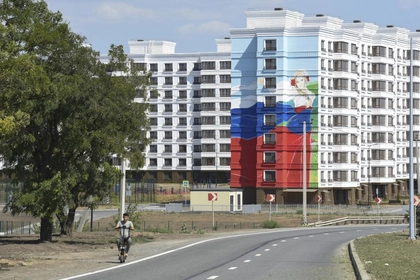In the build-up to the NATO Summit in Vilnius, Lithuania in July, NATO leaders are developing an Israel-style security agreement for Ukraine’s future, which may be in lieu of NATO membership for Ukraine, a May 22 Wall Street Journal (WSJ) report suggested.
“As Ukraine enters a pivotal stage in its war with Russia, US and NATO leaders are coalescing around a vision for shoring up Ukrainian defenses and seeking to guarantee the country’s sovereign future,” WSJ revealed. “It is a security model that Western leaders, including President Biden, have compared to what Israel has now.”
- See the latest war in ukraine update in the Kyiv Post’s news bulletins released today.
- Read the newest Ukraine news stories published today.
JOIN US ON TELEGRAM
Follow our coverage of the war on the @Kyivpost_official.
A US administration official told WSJ that discussion based on the “Israeli model” has emerged as a way to address the core of Ukraine’s security concerns, “recognizing that it wouldn’t achieve NATO membership soon.”
On the one hand, an Israel-style agreement could give Ukraine security guarantees, such as a long-term pipeline for the delivery of military aid, technology and training along with a commitment to bilateral intervention. On the other hand, it would avoid the fear, on the part of some members of the Alliance, that granting Ukraine NATO membership could be seen as an escalation of the current conflict with Russia.
While Israel isn’t a member of NATO, and the US isn’t treaty-bound to come to the country’s aid, WSJ wrote, it has for decades had a special relationship with the US. It is also the largest cumulative recipient of US foreign assistance since World War II.

Ukraine’s Usyk Beats Fury in Heavyweight Championship Rematch
US assistance to Israel currently comes under 10-year agreements; the most recent one commits Washington to $38 billion in military aid between 2019 and 2028 (which equals aid provided to Ukraine during the full-scale period).
Poland’s President Andrej Duda confirmed the discussions about the possible security agreement to WSJ.
“The discussions on this are going on right now,” said Duda. He briefed WSJ that “it is now gaining traction among Western allies as part of the agenda for the NATO Summit”.
Officials familiar with the talks told WSJ the new security agreement will be based on the draft Kyiv Security Compact, proposed by Ukraine in September 2022 and developed with the direct involvement of NATO’s Secretary General Anders Fogh Rasmussen and the head of Zelensky’s administration Andriy Yermak.
In his nightly message yesterday, delivered from a train returning him to Kyiv from the G7 Summit in Japan, Ukraine’s President Volodymyr Zelensky commented on the upcoming NATO Summit.
“Every week, we add value for Ukraine from the NATO Summit in Vilnius. We are doing everything to make sure that the decision at the Summit is the one that will work for us,” Zelensky said.
The draft Compact, according to an independent analysis by NGO NATO Watch, does not propose that NATO countries collectively offer their troops in defense of Ukraine’s sovereignty (as they do for each other as NATO members). Rather, it says there should be “no restriction” on the military, diplomatic and economic aid provided to Ukraine by NATO member countries through bilateral agreements.
The draft Compact further says that the “strongest security guarantee for Ukraine lies in its capacity to defend itself against an aggressor … To do so, Ukraine needs the resources to maintain a significant defensive force capable of withstanding the Russian Federation’s armed forces and paramilitaries…. This requires a multi-decade effort of sustained investment in Ukraine’s defense industrial base, scalable weapons transfers and intelligence support from allies, intensive training missions and joint exercises under the European Union and NATO flags”.
Under the proposal, according to NATO Watch, Ukrainian forces would be trained to NATO standards and “at the scale needed to build a robust territorial defense force and reserve force”. The guarantees, the draft Compact suggests, should not require Ukraine to limit the size or strength of its armed forces, and “nor should they be drawn in exchange for a specific status, such as neutrality”.
At the time of its preparation in late 2022, among those touted as signatories of the Compact are a core group of NATO countries and allies that “could include the US, UK, Canada, Poland, Italy, Germany, France, Australia, Turkey, and Nordic, Baltic, central and eastern European countries”. Japan, Singapore, South Korea and Switzerland and others would also come into the agreement while providing non-military and financial guarantees that would be automatically applied in the event of a further Russian attack.
During his recent tour of European capitals and attendance at the G7 Summit, Zelensky pressed allies and interlocutors about both Ukraine’s shorter-term military needs, such as the proposed “coalition of jets”, and its medium and longer-term alliances, such as via membership of the European Union and NATO.
In terms of the commitments he obtained, the UK, Germany, France and Italy adopted similar documents that set out their expectations for the upcoming NATO Summit. Berlin expressed its readiness to support Kyiv’s bid, but in a more restrained form than did London, Rome and Paris.
The UK declaration, for example, said that “ahead of the Vilnius Summit, we will work with Allies to deepen Ukraine’s interoperability with NATO, and to accelerate Ukraine’s transition to NATO standards. Together with our closest partners, we will pursue long-term security commitments that will support Ukraine to defend itself and deter future Russian aggression.”
In terms of bilateral diplomacy, it has been reported that Ukraine is forming a coalition that would support at least processes for it to become a member of NATO, and that 18 countries have already signed relevant declarations with Kyiv.
"Once we finally resolve the issue of providing aircraft, or rather, when you see F-16s patrolling the Ukrainian skies and see Ukrainian pilots flying them and shooting down Russian aircraft, there will be one fateful decision left in our foreign policy: NATO membership, " Ukrainian Foreign Minister Dmytro Kuleba recently said.
However, in a speech delivered to the Ukrainian American Forum’s War Time Economy Conference on Friday, May 19 the Ukrainian Defense Minister, Oleksii Reznikov, indicated that such an undertaking may not go far enough for Ukraine.
He said “Today Ukraine is fulfilling the function of NATO by destroying the capacity for aggression by the Russian Empire,” then went on to say that Ukraine could no longer simply accept assurances, such as the 1994 Budapest memorandum, for its future protection. He said that NATO membership was the only way forward, for both Ukraine and the Alliance.
You can also highlight the text and press Ctrl + Enter






